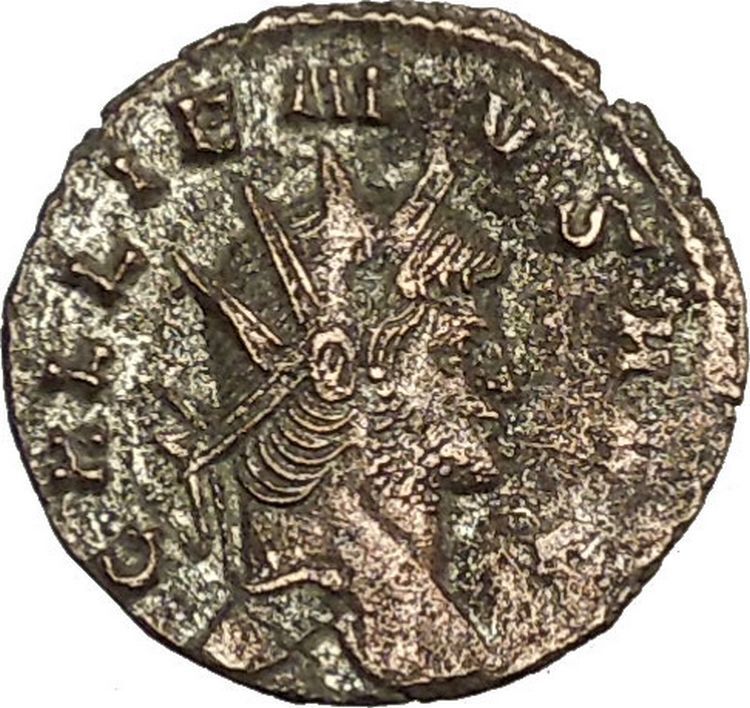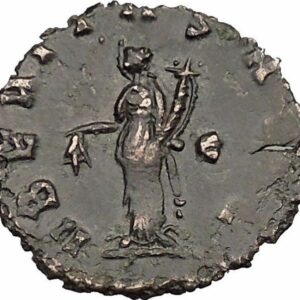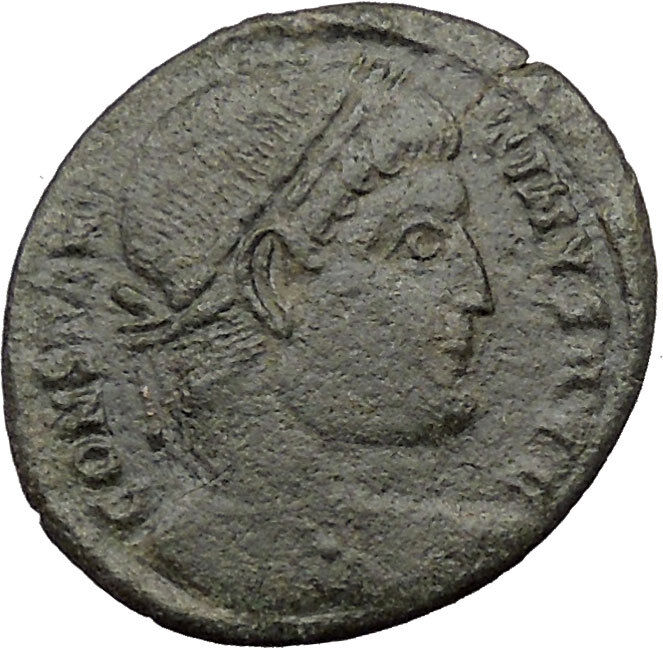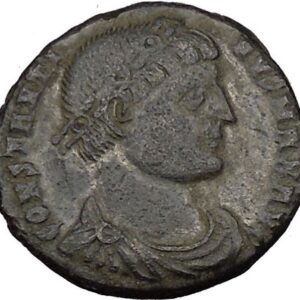|
Sabina – Roman Empress: 117-137 A.D. – wife of Emperor Hadrian
Silver Denarius 17mm (3.45 grams) Rome mint: 117-135 A.D.
Reference: RIC 395a; sear5 #3921; RSC 43
SABINA AVGVSTA, diademed and draped bust right, hair in queue down neck.
IVNONI REGINAE, Juno standing left holding patera and sceptre.
You are bidding on the exact item pictured, provided with a Certificate of Authenticity and Lifetime Guarantee of Authenticity.
 Juno, called Hera by the Greeks. The word Ju-no contains the same root as Ju-piter. As Jupiter is the king of heaven and of the gods, so Juno is the queen of heaven, or the female Jupiter. She was worshipped at Rome as the queen of heaven, from early times, with the surname of Regina. At a later period her worship was solemnly transferred from Veii to Rome, where a sanctuary was dedicated to her on the Aventine. As Jupiter was the protector of the male sex, so Juno watched over the female sex. She was supposed to accompany every woman through life, from the moment of her birth to her death. Hence she bore the special surnames of Virginalis and Matrona, as well as the general ones of Opigena and Sospita and under the last mentioned name she was worshipped at Lanuvium. On their birthday, women offered sacrifices to Juno surnamed Natatlis, just as men sacrificed to their genius natalis.The great festival, celebrated by all the women, in honour of Juno, was called Matronalia, and took place on the 1st of March. Her protection of women, and especially her power of making them fruitful, is further alluded to in the festival Populifugia, as well as in the surname of Februlis, Februata, Februta, or Februalis. Juno was further, like Saturn, the guardian of the finances, and under the name of Moneta she had a temple on the Capitoline hill, which contained the mint. The most important period in a woman’s life is that of her marriage, and she was therefore believed especially to preside over marriage. Hence she was called Juga or Jugalis, and had a variety of other names, such as Pronuba, Cinxia, Lucina, etc. The month of June, which is said to have been originally called Junonius, was considered to be the most favourable period for marrying. Women in childbed invoked Juno Lucina to help them, and newly-born children were likewise under her protection : hence she was sometimes confounded with the Greek Artemis or Ilithyia. In Etruria she was worshipped under the name of Cupra. She was also worshipped at Falerii, Lanuvium, Aricia, Tibur, Praeneste, and other places. In the representations of the Roman Juno that have come down to us, the type of the Greek Hera is commonly adopted. Juno, called Hera by the Greeks. The word Ju-no contains the same root as Ju-piter. As Jupiter is the king of heaven and of the gods, so Juno is the queen of heaven, or the female Jupiter. She was worshipped at Rome as the queen of heaven, from early times, with the surname of Regina. At a later period her worship was solemnly transferred from Veii to Rome, where a sanctuary was dedicated to her on the Aventine. As Jupiter was the protector of the male sex, so Juno watched over the female sex. She was supposed to accompany every woman through life, from the moment of her birth to her death. Hence she bore the special surnames of Virginalis and Matrona, as well as the general ones of Opigena and Sospita and under the last mentioned name she was worshipped at Lanuvium. On their birthday, women offered sacrifices to Juno surnamed Natatlis, just as men sacrificed to their genius natalis.The great festival, celebrated by all the women, in honour of Juno, was called Matronalia, and took place on the 1st of March. Her protection of women, and especially her power of making them fruitful, is further alluded to in the festival Populifugia, as well as in the surname of Februlis, Februata, Februta, or Februalis. Juno was further, like Saturn, the guardian of the finances, and under the name of Moneta she had a temple on the Capitoline hill, which contained the mint. The most important period in a woman’s life is that of her marriage, and she was therefore believed especially to preside over marriage. Hence she was called Juga or Jugalis, and had a variety of other names, such as Pronuba, Cinxia, Lucina, etc. The month of June, which is said to have been originally called Junonius, was considered to be the most favourable period for marrying. Women in childbed invoked Juno Lucina to help them, and newly-born children were likewise under her protection : hence she was sometimes confounded with the Greek Artemis or Ilithyia. In Etruria she was worshipped under the name of Cupra. She was also worshipped at Falerii, Lanuvium, Aricia, Tibur, Praeneste, and other places. In the representations of the Roman Juno that have come down to us, the type of the Greek Hera is commonly adopted.
_01.jpg/180px-Busto_de_Vibia_Sabina_(M._Prado)_01.jpg) Vibia Sabina (83-136/137) was a Roman Empress, wife and second cousin, once removed, to Roman Emperor Hadrian. She was the daughter to Salonina Matidia (niece of Roman Emperor Trajan), and suffect consul Lucius Vibius Sabinus. After her father’s death in 84, Sabina along with her half-sisters lived with their grandmother, mother and were raised in the household of Trajan, his wife Pompeia Plotina and her stepfather. Vibia Sabina (83-136/137) was a Roman Empress, wife and second cousin, once removed, to Roman Emperor Hadrian. She was the daughter to Salonina Matidia (niece of Roman Emperor Trajan), and suffect consul Lucius Vibius Sabinus. After her father’s death in 84, Sabina along with her half-sisters lived with their grandmother, mother and were raised in the household of Trajan, his wife Pompeia Plotina and her stepfather.
She married Hadrian in 100, at the Roman Empress Pompeia Plotina’s request, for Hadrian to succeed her great uncle, in 117. Sabina’s mother Matidia (Hadrian’s second cousin) was also fond of Hadrian and allowed him to marry her daughter.
They had no children and had an unhappy marriage. Sabina was said to have remarked that she had taken steps to see she never had children by Hadrian because they would “harm the human race”. It seems that she once aborted a child of theirs. Sabina was strong and independent and her beliefs in marriage didn’t sit well with the Emperor. Sabina had an affair with Suetonius a historian (and Hadrian’s secretary) in the year 119. In 128, she was awarded the title of Augusta. Vibia Sabina died before her husband, some time in 136 or early 137.
Namesake
Vibia Aurelia Sabina (170-died before 217), daughter and youngest child of Roman Emperor Marcus Aurelius and Roman Empress Faustina the Younger was a great, great niece to Vibia Sabina. Her name was bestowed in honor of Sabina and her father.
 Hadrian – Roman Emperor: 117-138 A.D. Hadrian – Roman Emperor: 117-138 A.D.
| First-cousin-once-removed and adopted son of Trajan | Husband of Sabina | Adoptive father of Aelius and Antoninus Pius | Grand-nephew of Trajan Pater |
Publius Aelius Hadrianus (as emperor Imperator Caesar Divi Traiani filius Traianus Hadrianus Augustus, and Divus Hadrianus after his apotheosis, known as Hadrian in English; 24 January 76 – 10 July 138) was emperor of Rome from AD 117 to 138, as well as a Stoic and Epicurean philosopher. A member of the gens Aelia, Hadrian was the third of the so-called Five Good Emperors.
Hadrian was born Publius Aelius Hadrianus in Italica or, less probably, in Rome, from a well-established family which had originated in Picenum in Italy and had subsequently settled in Italica, Hispania Baetica (the republican Hispania Ulterior), near the present day location of Seville, Spain. His predecessor Trajan was a maternal cousin of Hadrian’s father. Trajan never officially designated a successor, but, according to his wife, Pompeia Plotina, Trajan named Hadrian emperor immediately before his death. Trajan’s wife was well-disposed toward Hadrian: Hadrian may well have owed his succession to her.
Hadrian’s presumed indebtedness to Plotina was widely regarded as the reason for Hadrian’s succession. However, there is evidence that he accomplished his succession on his own governing and leadership merits while Trajan was still alive. For example, between the years AD 100-108 Trajan gave several public examples of his personal favour towards Hadrian, such as betrothing him to his grandniece, Vibia Sabina, designating him quaestor Imperatoris, comes Augusti, giving him Nerva’s diamond “as hope of succession”, proposing him for consul suffectus, and other gifts and distinctions. The young Hadrian was Trajan’s only direct male family/marriage/bloodline. The support of Plotina and of L. Licinius Sura (died in AD 108) were nonetheless extremely important for Hadrian, already in this early epoch.
|





 Juno, called Hera by the Greeks. The word Ju-no contains the same root as Ju-piter. As Jupiter is the king of heaven and of the gods, so Juno is the queen of heaven, or the female Jupiter. She was worshipped at Rome as the queen of heaven, from early times, with the surname of Regina. At a later period her worship was solemnly transferred from Veii to Rome, where a sanctuary was dedicated to her on the Aventine. As Jupiter was the protector of the male sex, so Juno watched over the female sex. She was supposed to accompany every woman through life, from the moment of her birth to her death. Hence she bore the special surnames of Virginalis and Matrona, as well as the general ones of Opigena and Sospita and under the last mentioned name she was worshipped at Lanuvium. On their birthday, women offered sacrifices to Juno surnamed Natatlis, just as men sacrificed to their genius natalis.The great festival, celebrated by all the women, in honour of Juno, was called Matronalia, and took place on the 1st of March. Her protection of women, and especially her power of making them fruitful, is further alluded to in the festival Populifugia, as well as in the surname of Februlis, Februata, Februta, or Februalis. Juno was further, like Saturn, the guardian of the finances, and under the name of Moneta she had a temple on the Capitoline hill, which contained the mint. The most important period in a woman’s life is that of her marriage, and she was therefore believed especially to preside over marriage. Hence she was called Juga or Jugalis, and had a variety of other names, such as Pronuba, Cinxia, Lucina, etc. The month of June, which is said to have been originally called Junonius, was considered to be the most favourable period for marrying. Women in childbed invoked Juno Lucina to help them, and newly-born children were likewise under her protection : hence she was sometimes confounded with the Greek Artemis or Ilithyia. In Etruria she was worshipped under the name of Cupra. She was also worshipped at Falerii, Lanuvium, Aricia, Tibur, Praeneste, and other places. In the representations of the Roman Juno that have come down to us, the type of the Greek Hera is commonly adopted.
Juno, called Hera by the Greeks. The word Ju-no contains the same root as Ju-piter. As Jupiter is the king of heaven and of the gods, so Juno is the queen of heaven, or the female Jupiter. She was worshipped at Rome as the queen of heaven, from early times, with the surname of Regina. At a later period her worship was solemnly transferred from Veii to Rome, where a sanctuary was dedicated to her on the Aventine. As Jupiter was the protector of the male sex, so Juno watched over the female sex. She was supposed to accompany every woman through life, from the moment of her birth to her death. Hence she bore the special surnames of Virginalis and Matrona, as well as the general ones of Opigena and Sospita and under the last mentioned name she was worshipped at Lanuvium. On their birthday, women offered sacrifices to Juno surnamed Natatlis, just as men sacrificed to their genius natalis.The great festival, celebrated by all the women, in honour of Juno, was called Matronalia, and took place on the 1st of March. Her protection of women, and especially her power of making them fruitful, is further alluded to in the festival Populifugia, as well as in the surname of Februlis, Februata, Februta, or Februalis. Juno was further, like Saturn, the guardian of the finances, and under the name of Moneta she had a temple on the Capitoline hill, which contained the mint. The most important period in a woman’s life is that of her marriage, and she was therefore believed especially to preside over marriage. Hence she was called Juga or Jugalis, and had a variety of other names, such as Pronuba, Cinxia, Lucina, etc. The month of June, which is said to have been originally called Junonius, was considered to be the most favourable period for marrying. Women in childbed invoked Juno Lucina to help them, and newly-born children were likewise under her protection : hence she was sometimes confounded with the Greek Artemis or Ilithyia. In Etruria she was worshipped under the name of Cupra. She was also worshipped at Falerii, Lanuvium, Aricia, Tibur, Praeneste, and other places. In the representations of the Roman Juno that have come down to us, the type of the Greek Hera is commonly adopted._01.jpg/180px-Busto_de_Vibia_Sabina_(M._Prado)_01.jpg) Vibia Sabina (83-136/137) was a Roman Empress, wife and second cousin, once removed, to Roman Emperor Hadrian. She was the daughter to Salonina Matidia (niece of Roman Emperor Trajan), and suffect consul Lucius Vibius Sabinus. After her father’s death in 84, Sabina along with her half-sisters lived with their grandmother, mother and were raised in the household of Trajan, his wife Pompeia Plotina and her stepfather.
Vibia Sabina (83-136/137) was a Roman Empress, wife and second cousin, once removed, to Roman Emperor Hadrian. She was the daughter to Salonina Matidia (niece of Roman Emperor Trajan), and suffect consul Lucius Vibius Sabinus. After her father’s death in 84, Sabina along with her half-sisters lived with their grandmother, mother and were raised in the household of Trajan, his wife Pompeia Plotina and her stepfather. Hadrian – Roman Emperor: 117-138 A.D.
Hadrian – Roman Emperor: 117-138 A.D.




